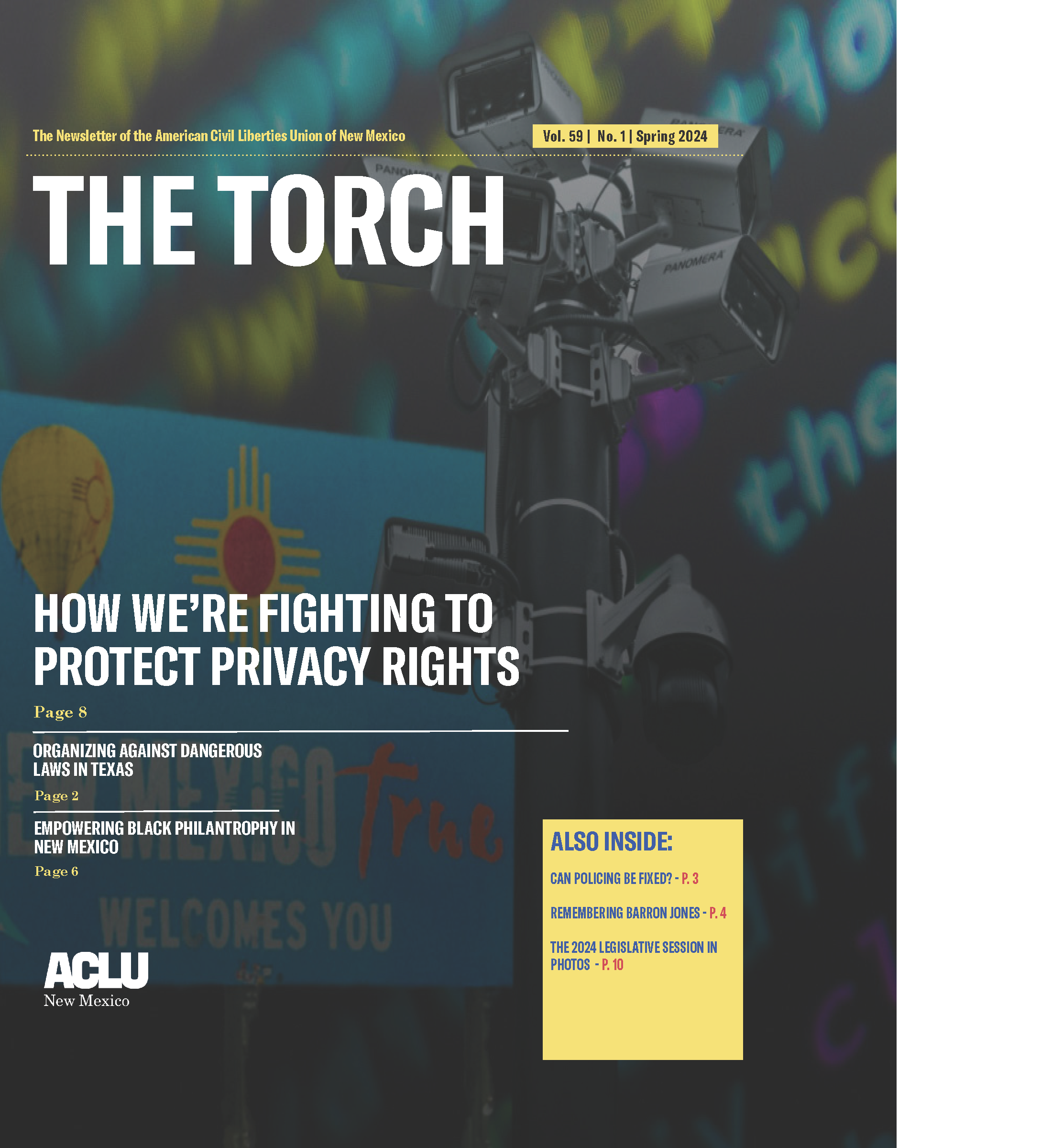In this interview, our Border and Immigration Policy Advocate Leonardo Castañeda shares how the ACLU of New Mexico and the Border Humanity Project (a group of ACLU affiliates in New Mexico, Arizona, San Diego, Imperial Counties, Texas, and the ACLU National Office) worked together to issue a travel advisory in response to extremist laws passed by Texas lawmakers that target immigrants and people of color.
The Texas legislature has passed some of the most cruel and deadly laws in the country in recent years, often backed by white supremacists and underscoring the state government’s ever-growing anti-immigrant sentiment. Operation Lone Star and the installation of concertina wire fencing at the Texas and New Mexico borders, as well as the use of deadly razor-edged river buoys on the Rio Grande, are prime examples.
One law, SB4-88S4, currently blocked by the courts, creates a new state crime for unauthorized entry or re-entry into Texas from a foreign country. It puts tremendous power in the hands of local and state law enforcement officers who are not trained in immigration law and have no constitutional authority to enforce it. It includes a provision to allow Texas judges to order people to leave Texas and go to Mexico without a chance to seek the legal protections to which they’re entitled. Another law signed by Texas Gov. Greg Abbott on November 21, SB4-88S3, creates completely disproportionate minimum sentences of up to 10 years for people accused of “human smuggling,” under which Texas has charged children as young as 14 to 17.
Carla Palacios (CP): Thank you for taking the time to chat with me, Leo! Can you share how the Border Humanity Project (BHP) works? How did all the ACLU border affiliates coordinate to strategize this travel advisory?
Leonardo Castañeda (LC): Sure! BHP provides a space and structure where southern border affiliates and ACLU National can collaborate with each other to promote and advocate for humane border policies. After Gov. Abbott signed SB-4 into law last December, we asked BHP and the affiliates bordering Texas – Oklahoma, Arkansas, and Louisiana – to review and sign-on to the advisory and share it with the community in their own states. We chose to involve all the border affiliates because it showed a unified front. This isn’t just a New Mexico issue, it’s a regional concern.
We reject racist efforts made by extremist politicians, and we stand in solidarity with our colleagues in Texas and border communities in opposition to this bill.
CP: Is that how our immigrants’ rights team came up with this action? How has this strategy been used in the past?
LC: We landed on this action by studying previous ACLU strategies. Our affiliate participated in the travel advisory issued about Arizona when their legislature passed the “Show Me Your Papers” bill (HB 1070) back in 2010. We didn’t invent this of course and there have been many organizations that have utilized travel advisories to warn their own residents about travel to states that have laws hostile to people of color, our LGBTQ+ community, etc. We appreciate this strategy because it sends a clear message: We reject racist efforts made by extremist politicians, and we stand in solidarity with our colleagues in Texas and border communities in opposition to this bill.
CP: The travel advisory generated a ton of buzz in the media when it first came out. Many of our supporters across our social platforms gave kudos given the severity of the laws that just came out of Texas. However, an interesting sentiment that came up in our ‘comments’ section was that this travel advisory only applied to New Mexicans living in a narrow part of Doña Ana County closest to the border. Can you elaborate why all New Mexicans should care about this issue and why the ACLU of New Mexico took action against these laws?
LC: These harmful laws being passed in Texas really impact a huge swath of New Mexicans because, one, people throughout the state have friends, relatives, or some kind of connections in Texas that results in them having to travel to that state. Secondly, all eastern New Mexico borders Texas. A lot of folks in those areas must travel to Texas for specialized medical care, access to advanced trauma centers, education, business, even air travel. People in cities like Hobbs and Clovis need to travel to Texas for all sorts of things.
CP: Can you share why SB4-88S4, which includes a provision to allow Texas judges to order people removed to Mexico without a chance to seek the legal protections to which they’re entitled is dangerous to anyone regardless of immigration status?
LC: At its core, this law gives law enforcement an invitation to racially profile folks. According to the language of the bill, if Texas law enforcement officials believe that individuals are not U.S. citizens who entered the country through Mexico, they can detain and possibly deport them. This is extremely concerning because we’ve seen before how easily mistakes happen with immigration enforcement. Just last May, a young man from Sunland Park with developmental disabilities who was a U.S. citizen was incorrectly deported to Mexico by federal immigration officers. SB4 makes untrained local police officers or sheriff’s deputies carry out extremely complex immigration laws. There are so few safeguards in place that this law puts anyone even just passing through Texas at risk of being racially profiled and having their basic civil rights, intentionally or unintentionally, violated in really terrible ways.
CP: Do you know if these bills have already caused civil liberties violations in impacted communities? Where does the bill sit now?
LC: These bills are currently on hold and have not gone into effect while they are reviewed by the Fifth Circuit Court of Appeals following challenges from the ACLU of Texas, ACLU National and other partners. It’s likely the U.S. Supreme Court will end up having to weigh in on this law.
We do not want to scare people away from accessing vital services or spending time with loved ones in Texas, but we do want them to know their rights.
CP: Were there any anxieties you had when you all published the advisory? How did you think it would be received?
LC: Much like a weather advisory, we wanted this to be a piece of helpful information that people could reference if they travel to Texas. We do not want to scare people away from accessing vital services or spending time with loved ones in Texas, but we do want them to know their rights.
CP: One last question, could you tell me what other actions BHP has taken as a group?
LC: Recently, we were given the opportunity to co-author a report highlighting a pattern of property confiscation by Border Patrol agents. The report identified incidents of people seeking asylum having vital belongings, including cash and medicine, taken away by Border Patrol agents while they were being detained and processed. We also had the opportunity to co-lead research asking people all along the border, in border counties, what they thought about various hot-button immigration policies. That research helped us better understand how border residents understood immigration in a broader way, the values that drive them, their concerns with spending, etc... We have access to all this information that wouldn’t have been accomplished without BHP.
CP: Thanks for taking the time to speak with me!
LC: Anytime!

